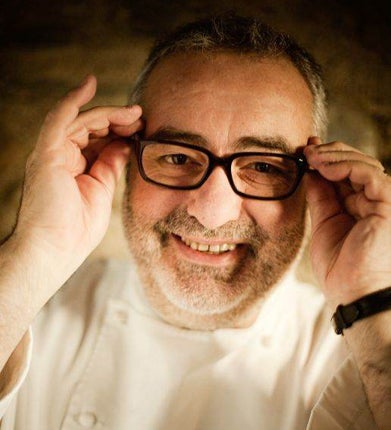Spain mourns the death of outspoken Michelin-starred chef

Spain's culinary masters are mourning the sudden death of the prestigious 53-year-old chef Santi Santamaria, perhaps the most controversial of a generation that revolutionized Spanish cooking. His creative twists on rural Catalan fare won him three Michelin-stars at his Can Fabes restaurant outside Barcelona and four more stars at eateries around the country, but his barbed criticism of the cantaloupe-caviar crowd also earned him much animosity in his later lifetime.
His death on Wednesday, reportedly of a heart attack while visiting his new restaurant in Singapore, puts an end to a rivalry with the guru of Spain's nueva cocina, Ferrán Adrià of el Bulli, and it has ushered in a truce with the country's experts in candy-coated quail eggs and other foods morphed into unrecognizable form.
"I'm in a state of shock like everybody is," Mr Adrià told a Catalan radio station yesterday. "Everyone knew that I had my discrepancies with Santi, but we knew each other for 25 years. For a time he was one of my best clients."
"We didn't have a chance to reconcile," he added.
Mr Santamaria, a self-taught farmer's son, was one of a generation of daring chefs who brought international fame to Catalan cuisine in the last two decades. His Can Fabes restaurant, which serves dishes such as wild mushroom flan and crème brûlée of spider crab with caviar, is one of three restaurants in the region awarded the rare, three-star ranking. He shares the honour with Adrià's el Bulli outside Gerona.
But the outspoken Mr Santamaria disapproved of the elaborate concoctions that emerged from the culinary laboratories of Mr Adrià and his many disciples, known for using industrial techniques to morph food into gels, ravioli-shaped spheres and other unusual forms. The chemistry component is so great in this cooking that some people have labelled the Adrià movement "molecular gastronomy," a term the El Bulli chef himself shuns.
Mr Santamaria's restaurant, by contrast, boasts of his back-to-basics approach with "rice from the Ebro delta, game out of the hunter's pouch, all carefully chosen and cooked with the utmost respect for natural flavours, tastes and forms, as well as for the local culinary tradition."
In a 2008 book, The Kitchen Laid Bare, Mr Santamaria called the molecular gastronomy camp "pretentious" and accused them of bowing to the "media circus" and "giving their clients dishes that they themselves would not eat." "I have an enormous conceptual and ethical divorce with Ferrán," he said at the book's launch before disbelieving peers. "He and his team are going in a direction contrary to my principles."
The celebrity chefs roared. The veteran Basque chef Juan Mari Arzak said Mr Santamaria was "envious" of his elBulli rival. Sergi Arola, an Adrià protégé, accused Mr Santamaria of sensationalism. Euro-Toques, a culinary association, scolded the rabble-rouser for causing "alarm" in an official statement of "indignation".
Mr Adrià himself indulged in some melodrama: "These have been the saddest weeks in the history of Spanish cuisine," he said at the time.
Indeed, Mr Santamaria touched a sensitive nerve in Spain, which was basking in the glow of international recognition for the first time in its modern history. The country that had been previously known abroad as a land of fried cod, tiny pickled fish and overcooked paella was suddenly the new France. The collective ego was riding high. Mr Santamaria's words seemed to throw cold water on the fiesta.
"The statement of our colleague endangers all we have achieved in recent years," the Euro-Toques association moaned. "It not only hurts the chefs but also damages our country's worldwide reputation".
Were they too harsh on the man who longed for the days when a potato omelette looked like a potato omelette? Whatever the answer, Santamaria's rival yesterday sensed another sad moment in the history of Spanish cuisine.
Subscribe to Independent Premium to bookmark this article
Want to bookmark your favourite articles and stories to read or reference later? Start your Independent Premium subscription today.

Join our commenting forum
Join thought-provoking conversations, follow other Independent readers and see their replies